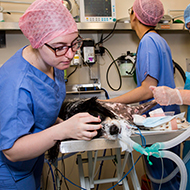
Findings could help mitigate owner concerns about anaesthetic risk.
A new study has concluded that dogs there is a relatively low risk of death from sedation and general anaesthetics for dogs in the UK.
The VetCompass research, published in the journal Veterinary Anaesthesia and Analgesia, analysed data from some 150,000 dogs under UK primary veterinary care.
Researchers found that the current risk is 14 deaths in 10,000 dogs within two weeks of sedation/anaesthesia procedures. For neutering surgeries specifically, the risk was much smaller, with one fatality in 10,000 neuter procedures related to sedation and/or anaesthesia.
There was no association between the age of the puppies at the time of neutering.
Dr Dan O’Neill, an associate professor in companion animal epidemiology at the RVC and co-author of the paper, said the findings could help mitigate owner concerns about anaesthesia and help them understand that the risk is not that high.
“Waving a tearful goodbye to your beloved dog as they are admitted for an anaesthetic at your veterinary surgery can be one of the scariest moments of many dog-owner’s lives,” said Dr O'Neill. “Decision-making based on the known can now replace fear of the unknown.”
Weighing up the benefits and risks for anaesthesia and surgery can be a major source of distress for owners. In this new study, researchers at the Royal Veterinary College and the University of Manchester set out to generate up-to-date information to help improve shared decision-making between veterinary professionals and owners.
The team found that older age, poorer overall health, more ugent surgeries and certain breeds, such as Rottweilers and West Highland White Terriers, were some of the key factors linked to an increased risk of sedation and aneasthetic-related death. Cocker spaniels, when compared with mixed breeds, were found to have a decreased risk.
Researchers also investigated whether brachycephalic breeds were associated with higher risk. Surprisingly, they found that longer-nosed breeds were four times at risk of sedative/anaesthetic-related death compared with medium-length nose dogs. There was no additional risk observed in brachycephalic breeds.
Dr Stephanie Shoop-Worrall, research fellow in epidemiology and data science at the University of Manchester and lead author of the paper, said: “VetCompass is an invaluable resource that has allowed the study of anaesthetic risks from dogs across the UK. These results can help reassure owners of the relative safety of sedation and anaesthesia in dogs, which is only getting safer over time, and can also prompt practice changes for veterinary surgeons to decrease risks further.”
Professor Dave Brodbelt, a professor of evidence-based veterinary medicine at the RVC and co-author of the paper, added: “This is a timely study that updates the current estimates of anaesthetic risk in the UK. Going forward, the use of electronic patient records from resources such as VetCompass provide an excellent opportunity to monitor this infrequent but important complication seen in veterinary practice.”



 The latest
The latest